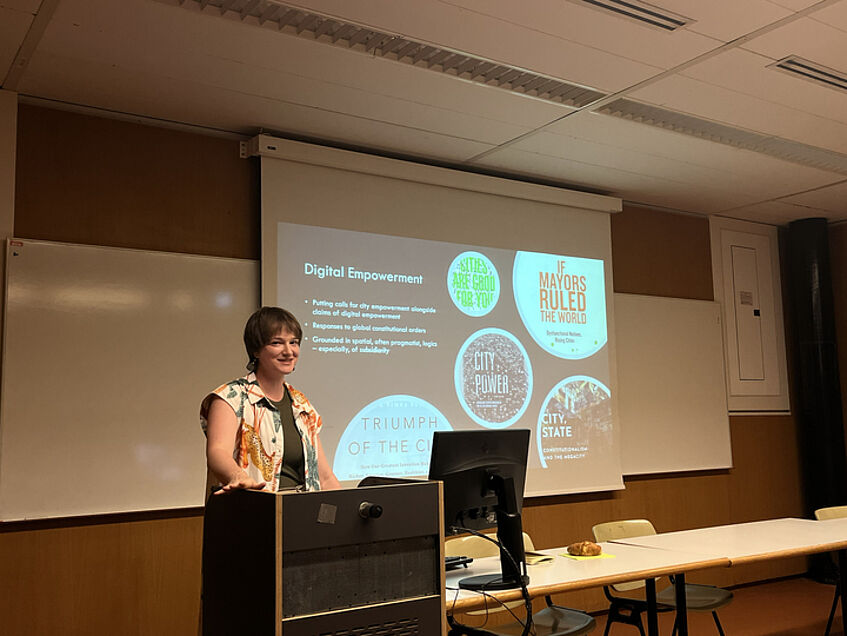TeamID Breakfast Lecture - “Our world is different”: Re-Constituting Subsidiarity in the Digital Age


TeamID Breakfast Lecture - “Our world is different”: Re-Constituting Subsidiarity in the Digital Age
by Lisa Müllner
On 12 September 2024, the Department of Innovation and Digitalisation in Law held a TeamID Breakfast Lecture as part of our TeamID Lunch Lecture Series.
The team of Professor Dr. Eisenberger invited our guest lecturer was Nicole West Bassoff who is a Ph.D. candidate in Public Policy at the Harvard Kennedy School and a Fellow in the Program on Science, Technology and Society (STS). She uses qualitative research methods and frameworks from the field of STS to interrogate the ethics and politics of efforts to digitize cities. Her dissertation project titled “The Urban Social Compact in the Digital Age” compares the outcomes of “smart city” initiatives in the U.S. in terms of their implications for political agency in times of digital transformation.
Ms. Bassoff held a talk on “Our world is different”: Re-Constituting Subsidiarity in the Digital Age. In her presentation, she explained her research motivation was to analyse situations where the promises of digital empowerment meet arguments for city empowerment. To set up a suggestion that these ideas of empowerment entail reconfigurations of our spatial imagination, she began with John Perry Barlow’s “A Declaration of the Independence of Cyberspace” (1996) which stated: “We are forming our own Social Contract. This governance will arise according to the conditions of our world, not yours. Our world is different.” Barlow’s declaration, she argued, contended that the internet was a new kind of “global social space” that could only be governed by its creators and inhabitants, i.e. those closest to the problem, thus containing echoes of the social and legal principle of subsidiarity. Ms. Bassoff therefore questioned whether new digital technologies and digital economies are affecting how we imagine place, scale, and proximity. She proposed that these transformations may threaten the logic of subsidiarity, i.e. our ideas of who is closest or most proximate to the problem.
To illustrate an example of digitization and its implications for subsidiarity, Ms. Bassoff presented a conflict that arose in the U.S. regarding digital connectivity: 5G rollout in the city of Portland (City of Portland v FCC, 9th Cir., 2020).
According to the U.S. 1996 Telecommunications Act, “[n]o State or local statute or regulation […] may prohibit or have the effect of prohibiting the ability of any entity to provide any interstate or intrastate telecommunications service”. However, cities such as the city of Portland had issued aesthetic regulations and high licensing fees constraining the private deployment of 5G “small cell” infrastructure in the public rights-of-way. Therefore, in 2018, the U.S. Federal Communications Commission (FCC) issued orders requiring that aesthetic regulations be objective, reasonable and no more burdensome than for other technologies, and preempting siting fees set above the costs to cities. Dozens of cities including the city of Portland took legal action against these orders, arguing that Congress, which passed the Telecommunications Act, could not have intended to “prevent communities from saying ‘no’ sometimes”. However, in its ruling, the U.S. Court of Appeals for the Ninth Circuit upheld the FCC orders, with an exception related to aesthetic regulations.
Ms. Bassoff argued that this ruling leads to a de facto separation of powers into powers regarding national economic distribution (to be delegated to private firms) and powers regarding local aesthetics (to be delegated to cities and towns). According to Ms. Bassoff, this separation narrows and diminishes the political agency of citizens at the local level, preventing cities from forcing firms to conform to local ideas of corporate citizenship in order to become part of public space.
In conclusion, to re-constitute subsidiarity in the digital age, Ms. Bassoff suggested that we need to build into our political and legal systems the constitutional infrastructures necessary for citizens to realize local political agency over the distributional terms and effects of digital progress. Digital empowerment in the spirit of subsidiarity means not allowing false promises of frictionless, universal digital progress to undermine the capacity of localities to confront the frictions of digitization “on the ground”.
The talk was followed by a lively and interesting discussion among our participants, deepening topics such as the deployment of self-driving cars, possibilities for empowering cities, and the implications of recent U.S. Supreme Court decisions walking back standards of legal deference to expert agencies in administrative law.
Thank you to Nicole West Bassoff for the presentation and contribution to this text. We very much look forward to the next TeamID Lunch Lecture in the course of the winter semester.
